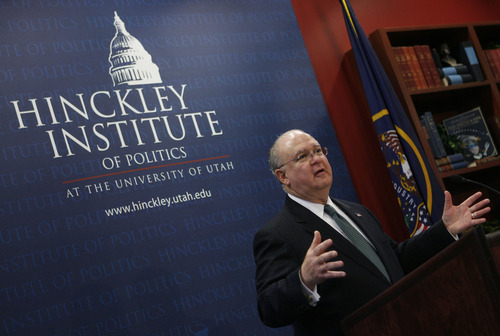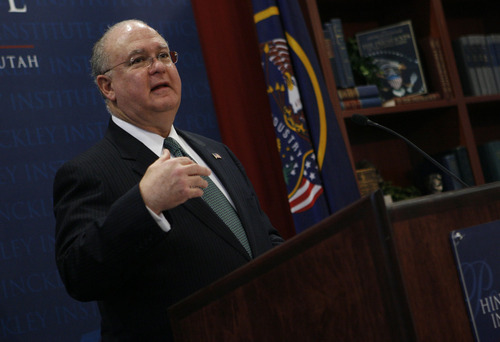This is an archived article that was published on sltrib.com in 2011, and information in the article may be outdated. It is provided only for personal research purposes and may not be reprinted.
Fretting over a scenario in which armed U.S. soldiers could be called to the border — or even over it — to hold back lawlessness and violence, Undersecretary of the Army Joseph Westphal invoked a contentious word to describe Mexico's problem with drug cartels:
He called it an "insurgency."
Speaking at the University of Utah's Hinckley Institute of Politics on Monday, the second-highest ranking civilian official in the U.S. Army spent most of his lecture explaining the economic and bureaucratic obstacles faced by defense budget makers amid complicated challenges in the Middle East and South Asia.
But in response to a student's question about strategic blind spots in U.S. foreign policy, Westphal switched hemispheres.
"One of them in particular for me is Latin America and in particular Mexico," he said. "As all of you know, there is a form of insurgency in Mexico with the drug cartels that's right on our border."
"This isn't just about drugs and about illegal immigrants," he said. "This is about, potentially, a takeover of a government by individuals who are corrupt."
Westfall — who said he was expressing a personal opinion, but one he had shared with the White House — said he didn't want to ever see a situation in which "armed and fighting" American soldiers are sent to combat an insurgency "on our border, in violation of our Constitution, or to have to send them across the border."
Westphal is the most senior U.S. official to publicly compare Mexico's drug cartels to an "insurgency" since Secretary of State Hillary Clinton made a similar assessment last September.
"We face an increasing threat from a well-organized network, drug-trafficking threat that is, in some cases, morphing into or making common cause with what we would consider an insurgency, in Mexico and in Central America," Clinton said at an event hosted by the Council on Foreign Relations. "It's looking more and more like Colombia looked 20 years ago."
Clinton won a strong rebuke for her words from Mexican government officials, who said her statement implied that U.S. intervention in Mexico was a legitimate policy option. President Barack Obama quickly rejected his senior diplomat's words — and in particular took offense at the comparison between Mexico and Colombia, where the U.S. ultimately sent soldiers to help disrupt the drug cartels.
But a Mexican government official familiar with Westphal's words said the Army leader "went way beyond what the Secretary of State said."
The official asked not to be named while senior diplomatic officers review Westphal's words and determine an appropriate official response. The undersecretary's speech is available at online at kuer.org/Hinckley.
Claudio Holzner, an assistant professor in the University of Utah's departments of political science and Latin American studies, said Westphal's words were "incendiary."
As violent and desperate as the situation has become in some parts of Mexico, Holzner said, "it's an overstatement to call the drug war an insurgency, primarily because the drug cartels are not seeking control of the government — they are seeking safe passage for their merchandise."
Holzner said it would be foolhardy for U.S. officials to consider sending troops into Mexico. "I think the solution is not a military one. The best thing the United States can do is to enforce its own laws and change the laws that are not working," to stem the demand for drugs in the U.S. and to stop the flow of U.S. weapons across the border, he said.





